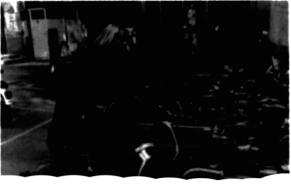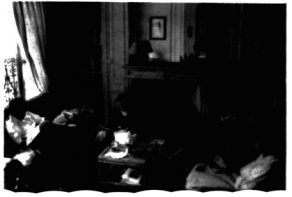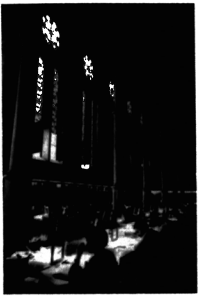9.2: What did you do yesterday?
- Page ID
- 142326
Questions et Réponses
A. What did you do yesterday?
- —Qu'est-ce que vous avez fail hier?
- —Je suis allée au cinéma avec Marie et Françoise.
- —Où étes-vous allées ce matin?
- —Nous sommes allées au Musée d'Orsay.
- —A quelle heure avez-vous pris le train?
- —J'ai pris le train à six heures.
B. What did you (used to) do when... ? (repeated, habitual)
- —Que faisiez-vous quand vous aviez cinq ans?
- —Je pleurais beaucoup.
- —Où habitiez-vous quand vous étiez à l'université?
- —J'avais un appartement en ville.
- —Quand jouiez-vous du violon?
- —Je jouais du violon quand j'avais six ou sept ans.

C. What were you doing when the phone rang? (Y in progress when X occurred)
- —Que faisiez-vous quand le téléphone a sonné?
- —Je prenais une douche quand le téléphone a sonné.
- —Où allait-il quand vous l'avez vu?
- —Il allait à la piscine.
- —Il était quelle heure quand vous avez entendu ce cri?
- —Il était six heures trois: j'ai regardé ma montre.
Grammar Notes: All the uses of the imperfect and passé composé that are illustrated above have been introduced previously. Here we reviewed the most common uses of each tense. Note again that in both tenses we are telling about something in the past and that, when the speaker views the action as completed— even if it took quite a while and might seem like the kind of thing that was ongoing or repeated—he or she uses the passé composé (Reference Grammar, 6.2.1 and 6.2.2).
Exercice II
At home, make up one example illustrating each of the models above (Nos. A, B, and C). Give both the question and the answer and be ready to write your example on the board and/or give it orally. It's fine to look back at previous lessons and exercises for ideas, but don't just "lift" sentences from those chapters.
Exercice III
Adverbs (Reference Grammar, 16.1). Rewrite completely the following sentences, adding an appropriate adverb in each one. Use the list below to find the adverb you want. Some of the words listed are adverbs, others are adjectives from which you must derive the corresponding adverb. Do not use any of the forms listed more than once, but you may certainly add other adverbs.
/ lent - doux - hier - demain - très /
- Ils sont arrivés.
- Parlez.
- Cet examen est difficile.
- Le professeur dit qu'il va rendre les examens.
- Fermez la porte.


LIRE, to read
| Je lis beaucoup. | I read a lot. |
| Tu lis le journal? | Are you reading the newspaper? |
| On ne lit pas assez. | People don't read enough. |
| Nous lisons une pièce en classe. | We're reading a play in class. |
| Est-ce que vous lisez l'anglais? | Do you read English? |
| Elles lisent des romans. | They read novels. |
| Passé composé: j'ai lu, ... | |
| Imparfait: je lisais, .. | |
| Futur: je lirai, ... | Futur proche: je vais lire, ... |

